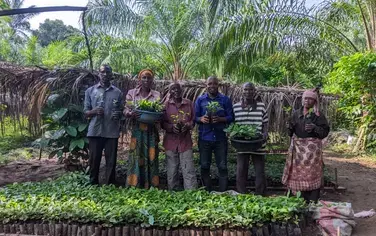Authors: Justin Murhula Nkumbarhi, Joseph Aganze, Gilbert Muvunankiko. Cover Image: COCAT
In the lush hills of Uvira Territory, South Kivu, a quiet yet powerful movement is underway. Women are transforming their lives and their environment through a well-known crop: coffee. Driven by Coopérative des caféiculteurs Tuungane [ Tuungane Coffee Growers Cooperative] (COCAT), they are restoring degraded lands while building a sustainable local economy.
With support and funding from TerraFund for AFR100, the reforestation project in the hills and plains of the Ruzizi region has already reached 1,532 producers, including 1,252 women. Together, they have put more than 190 hectares of land under restoration by planting more than 360,000 arabica and robusta coffee seedlings. Despite climatic and logistical challenges, nearly 80% of the seedlings have survived- proof of the community’s commitment.
For and With the Communities
Sustainability is at the heart of the project. COCAT conducts awareness campaigns on bushfire prevention, deforestation, erosion, and climate change. Partner farmers are also trained in agroecology, good agricultural practices, post-harvest management, and village savings and loan associations (VSLAs). “This project meets the needs of local communities and aligns with the Congolese government's vision,” says Joseph Aganze Kahasha, Project Manager.
Testimonial: Nsimire Bayoya, A Life Transformed by CoffeeMembers of the cooperative sorting coffee at its factory. Photo credit: COCAT
In Ndolera, 52-year-old Nsimire Bayoya now cultivates hope. A cooperative member for over five years, she received 500 improved arabica coffee seedlings and several technical training courses.
“Before, I grew coffee but i didnt have much hope. Today, I’m proud to produce quality coffee. I can pay my children’s school fees and even dream of expanding my plantation,” she shares.
In 2025, she harvested 280 kilograms of coffee cherries, yielding 54 kg of washed green coffee sold at $3.5 per kg- earning $189 in income. She invested in an improved drying rack for her coffee beans and plans to plant 1,000 more seedlings in 2026. “I dream of becoming a farmer-trainer for other women in my village,” she adds proudly.
Despite progress, insecurity in the Ruzizi Plain continues to challenge restoration efforts. Limited access to fields and washing stations has forced the cooperative to scale back technical support and temporarily suspend the certification process. “Some members have been displaced, and others have limited access to their fields,” says Perpétue Aime Zabibu, the cooperative’s manager. Still, agronomists and field facilitators remain committed, working hand in hand with local groups to keep restoration activities going.
Coffee That Changes Lives
COCAT’s coffee-based reforestation project is more than an agricultural initiative. It’s a quiet revolution led by courageous women who are restoring their lands, strengthening their economic independence, and inspiring their communities. Each coffee tree planted is a victory for the environment, a source of income for a family, and a symbol of hope for the future.
--------------------------------
About COCAT: A Women-Led Cooperative
Founded in 2012 by Madame Chantal BINWA ASSUMANI, COCAT is a cooperative managed and driven by women. It now includes over 1,500 members across 10 groups in Uvira Territory. Thanks to organic certification obtained by 787 members, the cooperative is now attracting both national and international buyers.




